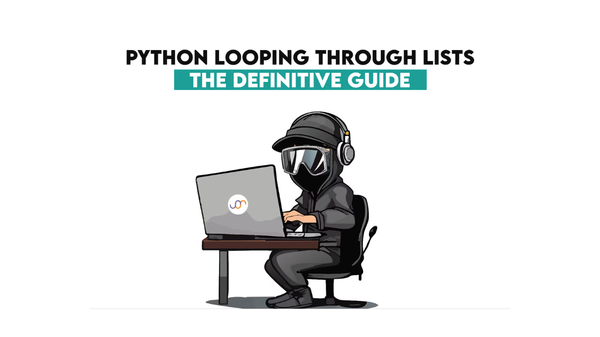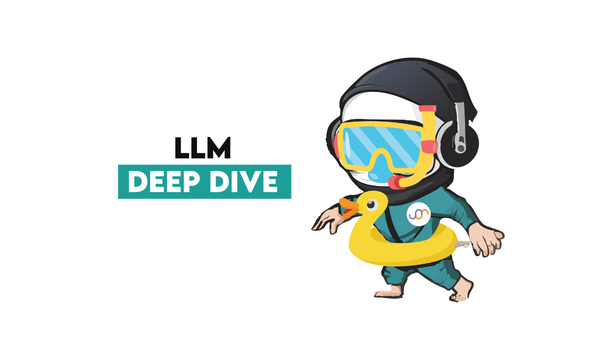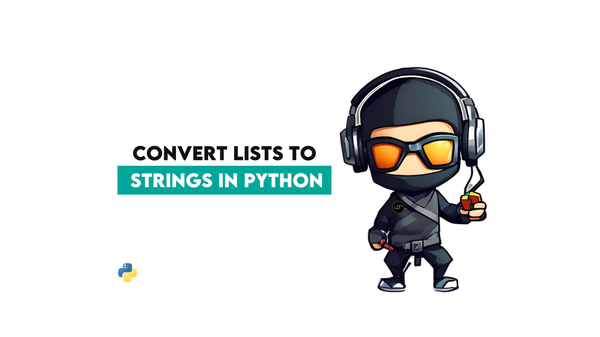A Beginner's Guide to Entry-Level Python Jobs
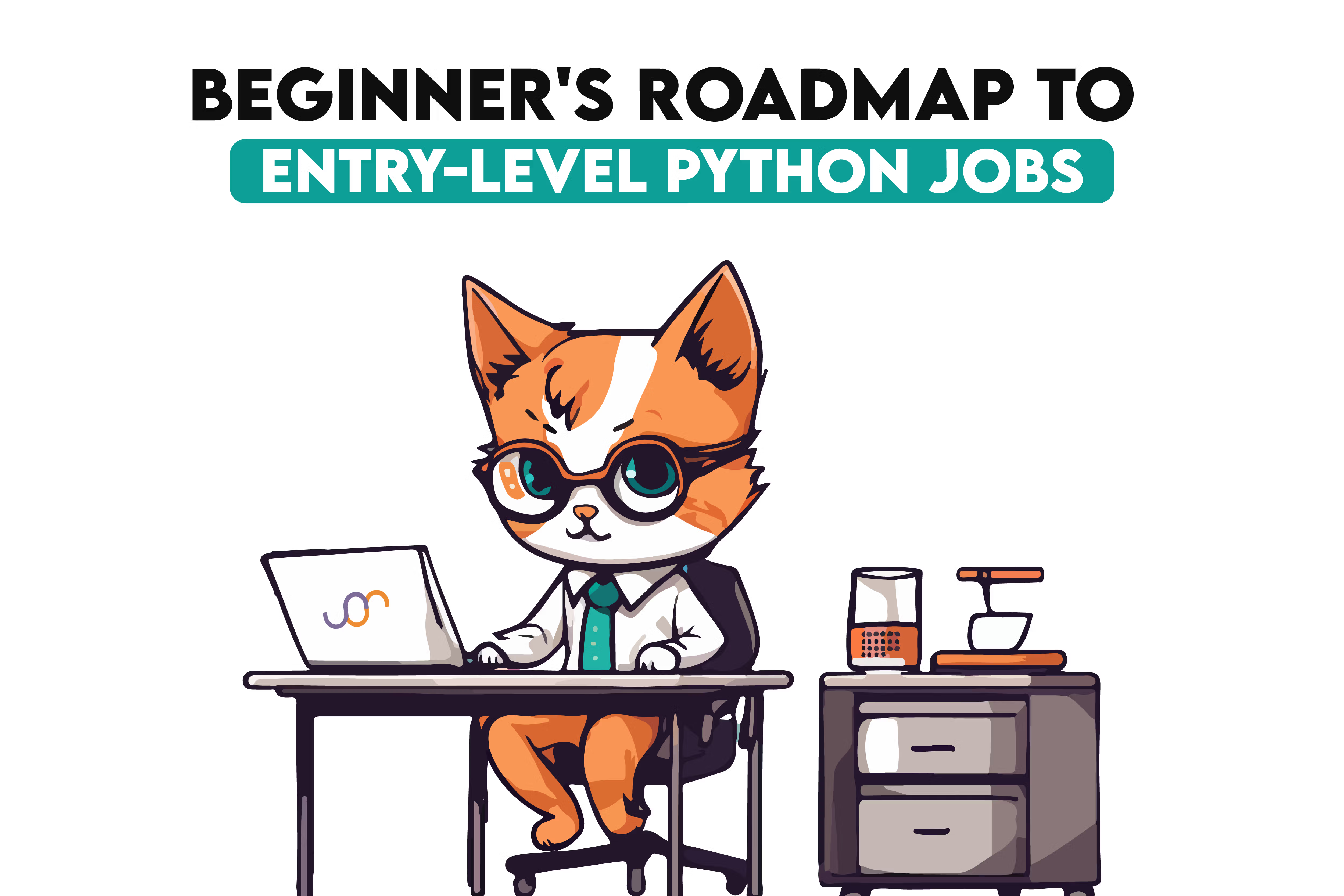
 Written by:
Written by:Nathan Rosidi
A career in data usually starts with entry-level Python jobs. Here’s a guide about these jobs, discussing everything you need to land such a job.
Python used to be an avant-garde programming language. Only a few of us heard about it, but no one actually used it. Yes, I remember those times, and I’m not that old.
Fast-forward and Python is one of the most popular programming languages. Everyone’s talking about it and learning it, and you, too, probably.
It’s no surprise since it’s an immensely flexible and versatile programming language. Its ubiquity in the last years means knowing Python is a prerequisite for opening doors to various career paths in data science, machine learning, software development, and many more.
The idea behind this article is to help you understand entry-level Python jobs. In other words, what they encompass, in which industries you can find them, and what you need to land one such job.
Understanding Entry-Level Python Jobs
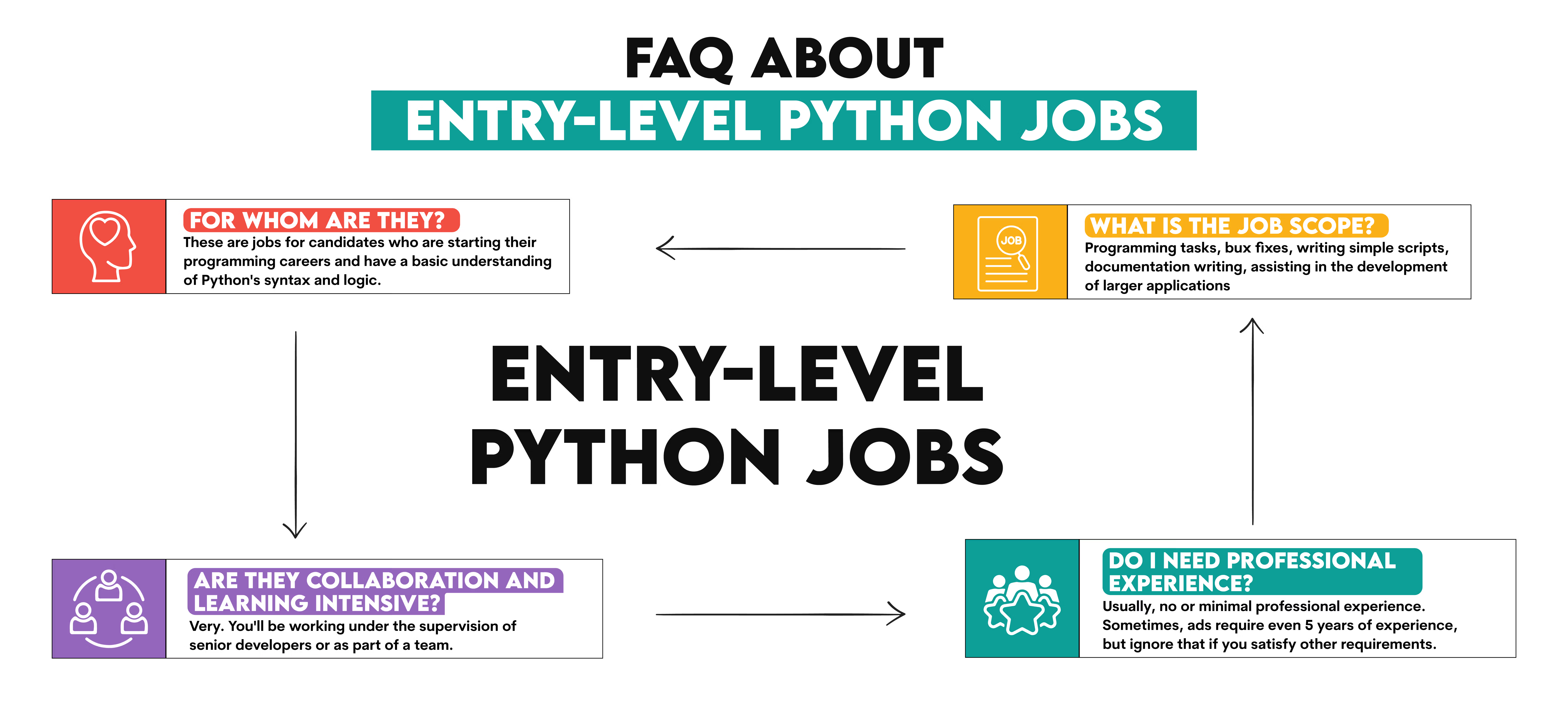
Entry-level Python jobs are designed for individuals who are just starting their programming career or have recently acquired Python skills. These roles typically require a fundamental understanding of Python's syntax and logic.
In practice, this means you will typically focus on basic programming tasks, bug fixes, writing simple scripts, or assisting in developing larger applications. As you gain more experience, the complexity of your tasks will gradually increase.
You’re a beginner, so that you will work under the supervision of senior developers or as part of a team. This is because your work has to be heavily reviewed and guided to make sure you don’t mess up something significant. But also, the purpose is for you to learn from more experienced colleagues who will review your work and guide you through tasks you might struggle with.
This means it’s also a very learning-intensive role, where on-the-job training is a key component. In addition to surrounding you with experienced colleagues, employees usually enhance the training opportunities by giving you work on diverse projects.
Regarding professional experience, you would think that ‘entry-level’ means no work experience is needed. This is true for many position job ads. But quite a few entry-level jobs, idiotic as it may sound, require work experience. I mean, you do need an actual job to get experience!

Don’t be discouraged by that because the job ads are written with an ideal candidate in mind.
The entry-level jobs might require even up to 5 years of experience. If I were you, I would ignore that and still apply for these jobs. That’s especially true if your skills and profile fit other job requirements. It’s unnecessary to match every requirement perfectly; companies use a wide range of criteria to select their candidates. So, don’t disqualify yourself in advance by not applying. You never know the exact selection criteria and the profiles of other candidates. Apply, and let the company make a selection. It’s their job, not yours!
Overall, an entry-level Python job is an excellent opportunity to apply your Python knowledge in a real-world environment. That’s the only way to reach advanced Python knowledge levels and grow professionally.
Speaking of professional growth, let’s look at industries that offer this type of job.
Types of Industries and Companies Hiring for Entry-Level Python Roles
Entry-level Python jobs can be found in every industry whose decision-making is dependent on data, its understanding, analysis, and modeling. That sounds like just about any industry today.
While this is not far from the truth, some industries are known for offering more such opportunities than others.
Here’s an overview of these industries and how they use Python.
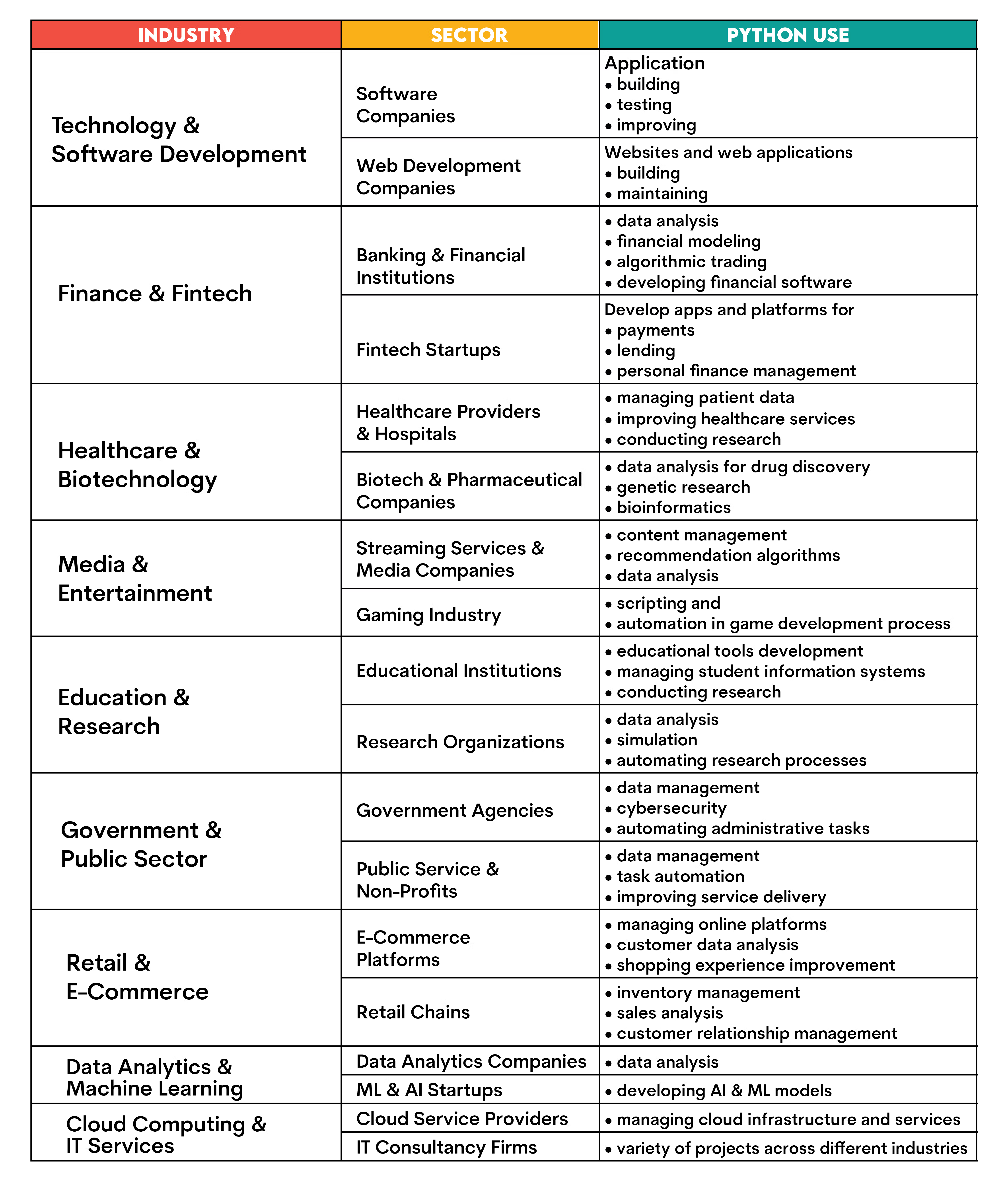
Key Skills Required for Entry-Level Python Jobs
Even though these are beginner positions, that doesn’t mean you don’t have to know anything. Unsurprisingly, your main skill at a Python job should be – Python.
Let’s examine its required knowledge level, as well as some other technical and non-technical skills.
Technical Skills

1. Proficiency in Python
This is the core skill you will need to land and excel at the entry-level Python job. Here’s what I mean by knowing Python for an entry-level job.
- Syntax Mastery: You have to be able to write clean and efficient Python code with a good understanding of Python functions, variables, data types, loops, and conditionals.
- Library Usage: Python’s flexibility shines through when combined with different Python libraries. There’s virtually no stage of a data science process that doesn’t call for using at least one library. So, you should have at least basic familiarity with some of them. What libraries should you focus on? These are the most important Python libraries by purpose.
- Data Collection (More info about these Data Collection Python Libraries.)
- Math & Data Analysis (More info about these Math & Data Analysis Python Libraries.)
- Machine Learning and Deep Learning (More info at the same link as above.)
- Data Visualization (More info about these Data Visualization Python Libraries.)
- Web Frameworks (More info about these Python Web Frameworks.)
- Debugging Skills: Debugging code will be one of your main tasks, so you should be reasonably skillful in finding and fixing errors in Python code.
2. Database Management and SQL
SQL is not always a requirement for this kind of job, especially as you can query databases using Python libraries to connect to SQL databases or connectors such as SQLAlchemy.
However, many entry-level Python jobs require some understanding of database principles and SQL. Even if they don’t, knowing SQL will help you at your job, as it is still an unsurpassed language for working with databases.
I advise you to know at least the basics of:
1. Relational Databases: You should be familiar with relational databases, their characteristics, and concepts such as tables, relationships, rows, and columns.
2. SQL Queries: Knowing how to write at least basic SQL queries to retrieve and manipulate data will benefit you a lot. If you can, learn the SQL dialect of the database you’ll use at your future job. If not, no need to panic. Once you’re familiar with one of the four most popular database systems, you’re good; transitioning to another database is not that hard once you get used to a different interface and few syntax differences. So, learn one of these:
3. Version Control With Git
Collaborative coding is standard in the tech industry. You’ll be doing much of this, especially as you’re still a beginner, and your code must be reviewed. Knowing how to use Git for version control will be crucial for you, and this encompasses:
- Basic Commands: Being able to clone repositories, commit changes, create branches, and merge code using Git.
- Collaboration: Understanding how to collaborate with team members through Git and platforms like GitHub or GitLab.
4. Problem-Solving Skills
You won’t write your Python code in a vacuum; the purpose will always be to solve business problems. Usually, complex ones. Because of that, doing well on the job depends on your:
- Analytical Thinking: The ability to break down problems into smaller, manageable parts and devise solutions.
- Algorithmic Knowledge: Familiarity with common algorithms and data structures, as well as knowing when to apply them.
5. Specialization Skills
Most entry-level Python jobs require the three technical skills above. However, every data job has its specifics and specialization, so the other required technical skills depend on the type of job.
For example, if you’re applying for a data scientist job, you’ll also need to have basic knowledge of statistical concepts, such as:
- Descriptive Statistics
- Mean
- Median
- Mode
- Measures of Dispersion
- Variance
- Standard Deviation
- Range
- Probability and Probability Distributions
- Hypothesis Testing
- Sampling and Sample Distributions
- Confidence Intervals
- Correlation and Regression
- Statistical Testing Methods
- Bayesian Statistics
- Non-Parametric Statistics
- Resampling Methods
- Machine Learning Algorithms
In case you really are interested in a data science career, here’s a helpful guide on how to get a data science job.
Non-Technical Skills
Though the technical skills are most important, there are some critical non-technical skills required for entry-level Python jobs.
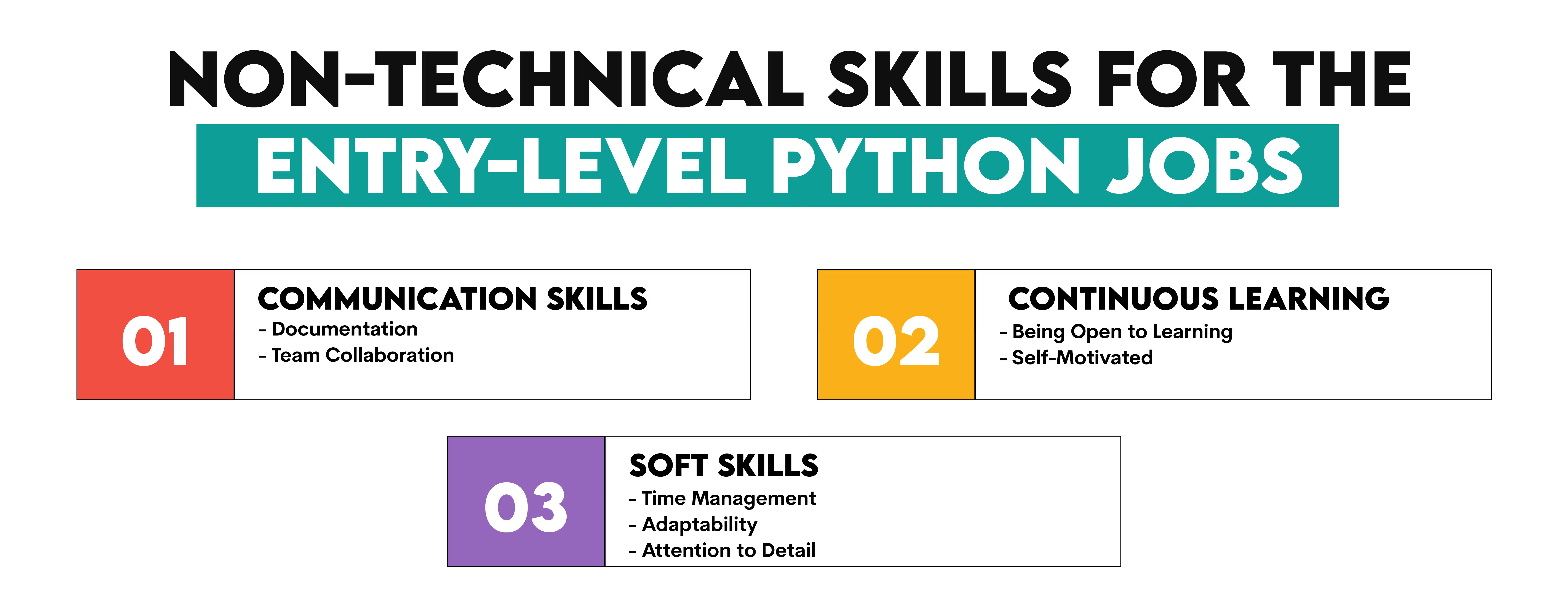
1. Communication Skills
As you’ll be working in a team, communicating effectively will be essential for you.
- Documentation: Writing clear and concise code comments and documentation to make code understandable to others.
- Team Collaboration: This includes discussing your and others' ideas, sharing progress on your task, and seeking help when you need it.
2. Continuous Learning
I already mentioned this is a learning-intensive position. To succeed in this job, you’ll have to learn all the time, which you can enhance by:
- Being Open to Learning: Willing to learn new libraries, frameworks, and best practices as they emerge. Of course, you should be open and ask for feedback from your experienced colleagues; this is an immense opportunity to learn.
- Self-Motivated: You should take the initiative to explore and experiment with new Pythong features and techniques.
3. Soft Skills
Getting and succeeding in a Python job is not easy. It’s also not a perfect job; it can be stressful, time-constrained, and occasionally require working long hours. To help you get through this, you should hone these skills.
- Time Management: Managing work efficiently, setting priorities, and meeting deadlines.
- Adaptability: Adapting to changes in project requirements or technology stack.
- Attention to Detail: Ensuring code quality and accuracy in all tasks will not only save you from embarrassment but also save you time by preventing you from revisiting the code.
Preparing for the Job Market
Getting ready for the job market means developing a strategy for obtaining relevant education and skills.
Here are the steps this includes.
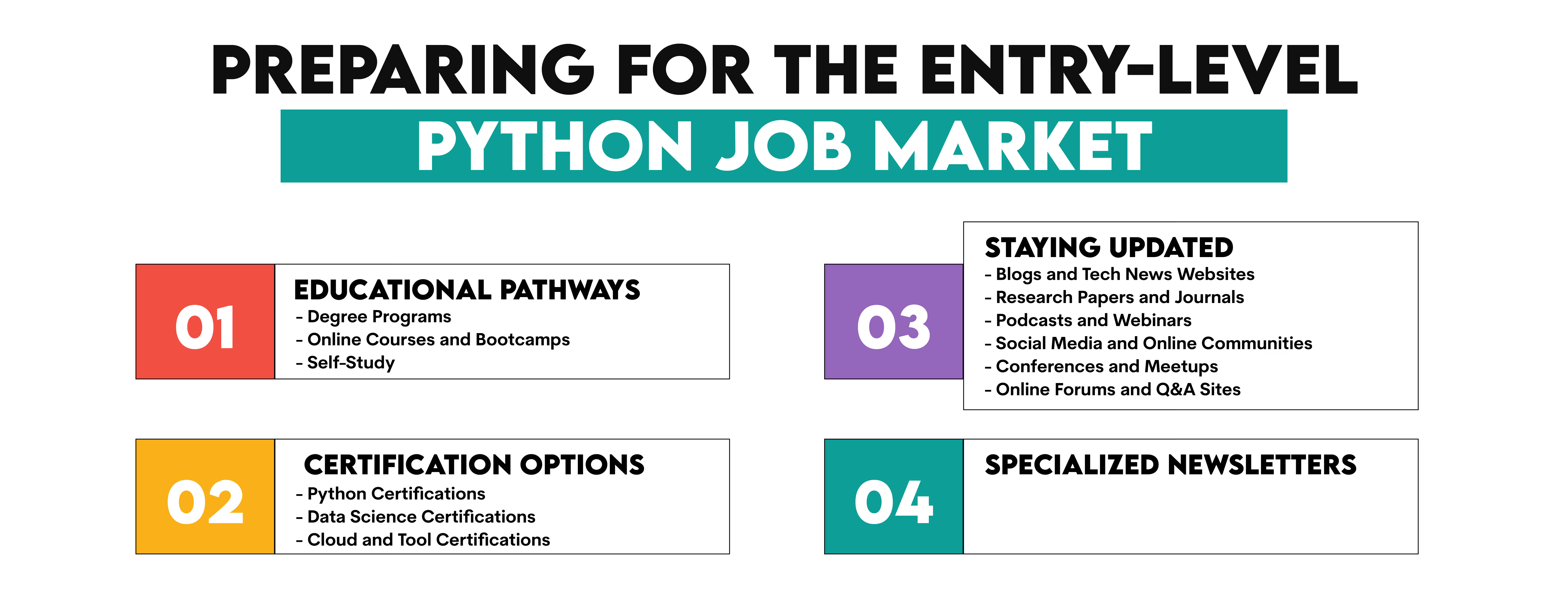
1. Educational Pathways
There are several different educational pathways available. You can choose one that suits you best or combine them.
- Degree Programs: Consider pursuing a bachelor's or master's degree in computer science, data science, or a related field. These degrees provide a strong foundation in programming and data analysis. If you already have a degree in a different field, you can also explore post-baccalaureate programs or online master's degrees in data science.
- Online Courses and Bootcamps: Enroll in online courses or coding bootcamps focused on Python, data science, or machine learning. Platforms like Coursera, edX, Udacity, Udemy, and DataCamp offer specialized programs. These programs often provide hands-on experience and practical skills in a shorter time frame than traditional degrees.
- Self-Study: To learn and practice Python, utilize free online resources such as Python documentation, YouTube tutorials, blog articles with examples and Python interview questions, and interactive coding platforms like StrataScratch, LeetCode, Codecademy, and HackerRank.
2. Certification Options
Getting a certification in your field can be tangible proof of your skills in Python. It also looks nice on your resume; employees absolutely love it!
- Python Certifications: Consider obtaining Python certifications such as the "Python Institue PCAP - Certified Entry-Level Python Programmer", and "Python Institue PCAP - Certified Associate Python Programmer".
- Data Science Certifications: Pursue data science certifications like the "Data Science Professional Certificate" from edX or the "Google Data Analytics Professional Certificate" on Coursera.
- Cloud and Tools Certifications: If you plan to work with cloud platforms or specific tools like AWS, Azure, or TensorFlow, consider relevant certifications to showcase your expertise.
3. Staying Updated
Data science is a rapidly changing profession, driven by and impacted by technological changes. You should stay in touch with it by utilizing some of these resources.
- Blogs and Tech News Websites, e.g.,:
- Research Papers and Journals on:
- Podcasts and Webinars
- Social Media and Online Communities, e.g.,:
- Conferences and Meetups, e.g.,:
- Online Forums and Q&A Sites, e.g.,:
- Specialized Newsletters
Finding Entry-Level Python Jobs
To show all those skills I mentioned earlier, you first need to find a job. How do you do that, and where?
Here are some strategies and resources.

1. Online Job Portals
Looking for job ads on the online job portals is the most obvious step. And yes, websites like LinkedIn, Indeed, Glassdoor, Levels.fyi, or SimplyHired offer a plethora of entry-level Python jobs.
Here’s how to best leverage them.
- Create a Profile: Set up a professional profile on these platforms, highlighting your Python skills, education, and any relevant projects or coursework.
- Customize Job Alerts: Set up job alerts with specific keywords like "entry-level Python developer" or "Python programming intern" to receive notifications when relevant positions are posted.
- Apply With Care: Tailor your resume and cover letter to each job application, emphasizing your Python skills and any relevant experience.
2. Networking
I know building a professional network without any job experience is difficult. It’s much easier once you’re ‘in the circle’, when you’ve spent several years in a company or changed companies, so you personally know many people from the community. However, there are also other ways to network. I would advise you to try some of these approaches, as they might significantly enhance your job search.
- Attend Meetups and Conferences: Join local or online Python meetups and attend industry conferences. Knowing people from the community can lead to more job opportunities.
- Use LinkedIn: You can also use LinkedIn to connect with professionals in your industry, including recruiters. Find relevant groups and discussions, and start getting involved in them.
- Leverage Alumni Networks: If you have a university or college alum network, reach out to alums working in the industry for advice and potential job leads.
3. Recruitment Agencies
Another strategy you can use is not waiting for recruitment agencies to find you but approaching them.
- Submit Your Resume: Send your resume to recruitment agencies specializing in tech and Python roles. They can match you with suitable job openings.
- Consultation: Recruitment agencies often provide career consultation and interview preparation services.
4. Company Websites
Find the companies you’re interested in, and use their websites to get yourself a job.
- Direct Applications: Many companies post job openings directly on their websites. Check for entry-level positions or internship opportunities.
- Open Job Application: If there are no suitable openings, send an open job application. While that doesn’t mean you’ll immediately get a job, being proactive is always a good look. Employees usually appreciate that and put you in the database. So, there’s a chance they’ll contact you when they start looking for someone with your profile.
- Company Research: Learn about a company's culture, values, and projects before applying to ensure a good fit.
5. Freelancing and Gig Platforms
Consider freelance work or short-term gigs to gain experience and build your portfolio.
- Freelancing: Platforms like Upwork, Fiverr, Toptal, and Freelancer.com feature Python-related freelance projects. If you get to work on several of those projects, this can significantly boost your experience and standing at future full-time employment.
- GitHub and Portfolio: Maintain a GitHub profile with your code projects and contributions to showcase your skills to potential clients or employers.
6. Online Communities
Participating in online Python communities can lead to job opportunities.
- GitHub: Here’s GitHub again, where you can contribute to open-source projects or create your own. It can demonstrate your coding skills and commitment to the Python community.
- Python Forums: Participate in forums like Stack Overflow and Python community forums. Answering questions and sharing knowledge can help you establish your expertise.
7. Internships and Volunteering
Internships and volunteer opportunities can provide valuable hands-on experience and lead to full-time roles.
- University Programs: Check if your university or college offers internship programs or partnerships with companies.
- Non-Profits and Community Organizations: Offer your Python skills to non-profit organizations as a volunteer. This experience can enhance your resume.
8. Local Job Boards and Classifieds
While these might not be your primary source of job ads, don’t overlook local job boards and classified ads; some smaller companies may post entry-level positions there.
9. Build a Strong Online Presence
Maintain an active and professional online presence, including a LinkedIn and GitHub profile and a personal website. Share your projects, code samples, and achievements to showcase your skills to potential employers.
Application Process for Entry-Level Python Jobs
Once you have all the relevant education, certificates, and skills and you found some jobs you like, it’s time to start with the application process. The particularities depend on the job and the company’s selection process. But, in general, it boils down to several stages.

The first stage starts with you applying for a job.
1. Apply/Send Resume and Cover Letter
Applying for a job includes writing your resume and cover letter.
- Resume: Craft a tailored resume that highlights your relevant skills, experience, and education. Emphasize your proficiency in Python, any projects you've completed, and any internships or coursework related to the job. Importantly, include a skills section to showcase your expertise in Python libraries and tools. Let the writing style include action verbs and quantifiable achievements to describe your accomplishments.
- Cover Letter: Write a compelling cover letter that introduces yourself, explains why you're interested in the role, and highlights your Python skills and qualifications. Mention specific projects, coursework, or experiences that demonstrate your ability to contribute to the company.
2. Pre-Screening
When a recruiter or a company contacts you, and you enter their selection process, sometimes the first hurdle you have to overcome is online pre-screening. This means completing online coding assessments or quizzes. The purpose is to gauge your coding skills and see if you fit the job requirements.
3. Phone or Video Interviews
The next stage after pre-screeing is phone or video interviews. They usually include:
- Technical Questions: These interviews include discussions about Python concepts, algorithms, and data structures. You should know how to explain your problem-solving approach and thought process. You will not only talk here; these interviews often involve online coding challenges.
- Behavioral Questions: The behavioral questions assess your soft skills, teamwork, and problem-solving abilities. Learning to structure your answers using the STAR method (Situation, Task, Action, Result) may help you fare better in this kind of interview.
This stage is commonly conducted by a hiring manager or a team member.
4. Take-Home Projects
These projects typically involve real-world tasks or coding challenges that candidates must complete within a specified timeframe, often ranging from a few days to a week. Their purpose is to test your skills and problem-solving abilities.
They are usually the most wholesome test of your technical skills, from data collection and exploration and statistics to machine learning and model building, all depending on the particular project and job description.
5. On-Site Interviews
This is the final stage where you can impact an employer’s hiring decision. These interviews include technical (both coding and non-coding) and behavioral questions. They are usually a whole-day event, where you’ll have several interviews with your superior, teammates, and other colleagues.
If you’re lucky enough, you’ll also get lunch!
6. Offer Negotiation
If you are successful in all stages, the employer will offer you a job. Research industry standards for entry-level compensation packages, and don’t undersell yourself. Yes, you can negotiate, and you should do it if the offer is not up to your standards.
7. Acceptance and Onboarding
Once you’ve negotiated the terms and are satisfied with the offer, formally accept the job. Then, you’ll enter your company’s onboarding process, which usually includes paperwork, training, and orientation.
Career Progression and Growth
There are numerous types of entry-level Python jobs, but the path very often starts with a data analyst, a junior data scientist position, or a junior Python developer. From there, it can branch out in several directions.
Also, keep in mind that once you go in one direction, it doesn’t mean you must stay there. The paths can overlap, as there are many shared skills between each job and path. So, if you get bored with one type of job, it doesn’t mean you can’t change direction, for example, from data engineering to product management.
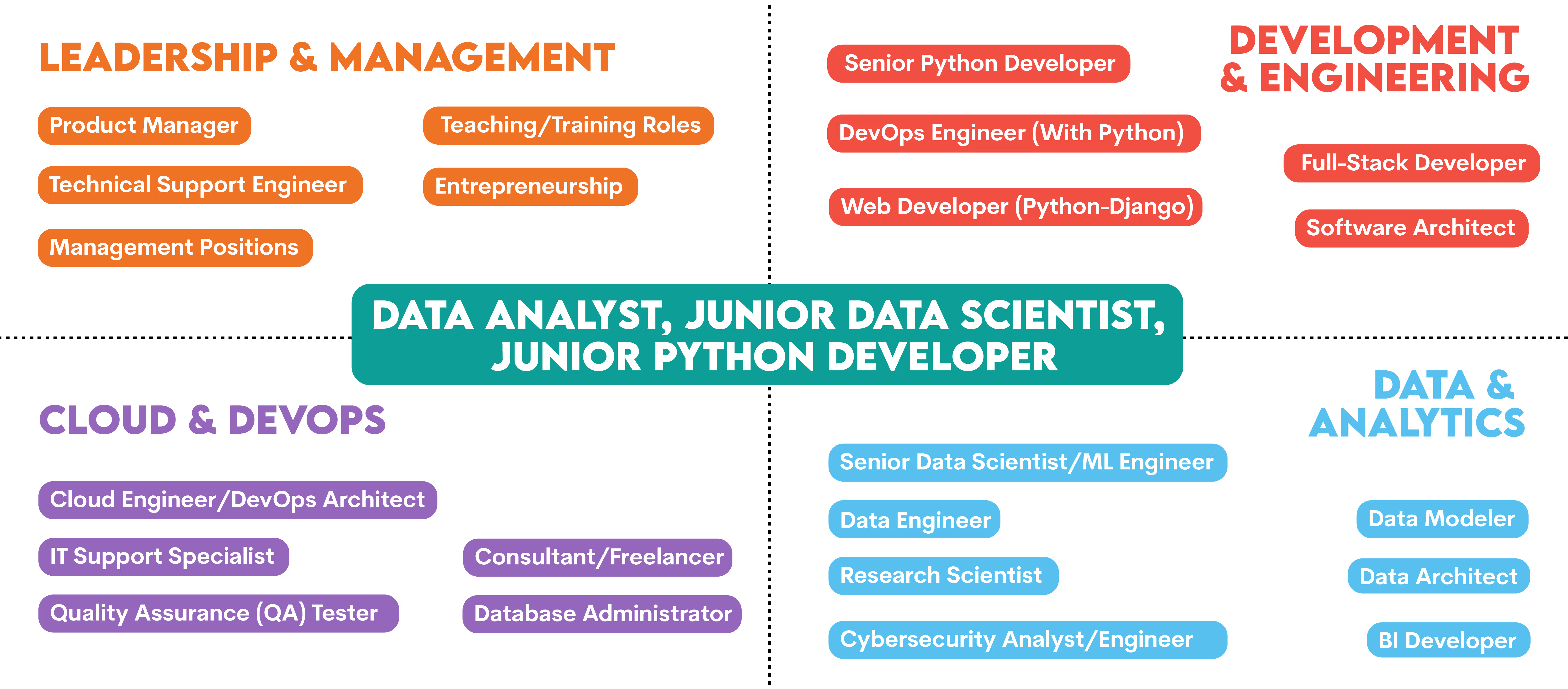
1. Development and Engineering
After you gain some experience, you might dedicate yourself to development and engineering. Some of the jobs you can find in this field include:
- Senior Python Developer: At a senior developer level, you will lead development teams, design complex systems, and architect solutions.
- Web Developer (Python-Django): Here, you will focus on web application development using Python and Django.
- DevOps Engineer (With Python): This position offers you the opportunity to specialize in automation, deployment, and infrastructure management.
- Full-Stack Developer: By doing this job, you will master both front-end and back-end development with Python.
- Software engineer: This role involves developing software applications.
- Software Architect: As a software architect, you will design and oversee the architecture of software systems.
2. Data and Analytics
One of the possible paths in your career is data and analytics, where you could work as:
- Senior Data Scientist/ML Engineer: These roles involve more advanced data analysis, ML model development, and predictive analytics.
- Data Engineer: You can also transition to data engineering, where you design and manage data pipelines, databases, and ETL processes to support data-driven applications.
- Research Scientist: In this role, you’ll contribute to scientific research using Python for data analysis and simulations.
- Cybersecurity Analyst/Engineer: This role will make you a cybersecurity and security tool development specialist.
- Data Modeler: Data modelers design data structures and databases.
- Data Architect: Data architects focus on designing data systems and strategies.
- BI Developer: Business Intelligence (BI) developers work on data visualization and analytics tools.
3. Cloud and DevOps
Another career path from the entry-level Python job is the cloud and DevOps jobs.
- Cloud Engineer/DevOps Architect: Here, you will work with cloud-native technologies and infrastructure as code (IAC).
- IT Support Specialist: This job gives you the opportunity to manage IT infrastructure with a focus on automation.
- Quality Assurance (QA) Tester: You can also transition to automated testing and quality assurance with Python.
- Consultant/Freelancer: As a consultant or a freelancer, you could use your experience to offer specialized services related to cloud and DevOps.
- Database Administrator: Database administrators create, manage, and maintain databases.
4. Leadership and Management
If you’re more interested in leadership and management positions, that’s also possible with the entry-level Python job used as a springboard.
- Product Manager: This position oversees software product development and guides product decisions.
- Technical Support Engineer: You can also progress into technical leadership roles within support teams.
- Management Positions: You could lead data science, development, or IT teams as a manager or director.
- Teaching/Training Roles: You can also become an instructor or educator, sharing your expertise with others.
- Entrepreneurship: With enough experience and connections, starting your own business can also be a good idea.
Conclusion
If you want a career in Python, you must start somewhere; entry-level Python jobs are designed exactly for that. They will provide you with a solid foundation for building up your skills and gaining experience for career development in many directions.
Starting with entry-level jobs can lead you into development and engineering, data science and analytics, or cloud, DevOps, and leadership positions. The key to success lies in your technical skills, willingness to continuously learn and adapt to new developments, and soft skills.
But before embarking on that journey, you must be ready for the job market and ace a job interview. This involves getting the relevant education, practicing Python coding, and solving many diverse technical and behavioral interview questions.
StrataScratch is perfect for that; we offer more than a thousand coding interview questions. They will help you practice Python and SQL and get used to the questions you’ll get in actual interviews. After extensive practice, you start interviewing for a job; it will feel like you went through that experience many times. In a way, you did. That’s why you’ll get a job this time.
Share
